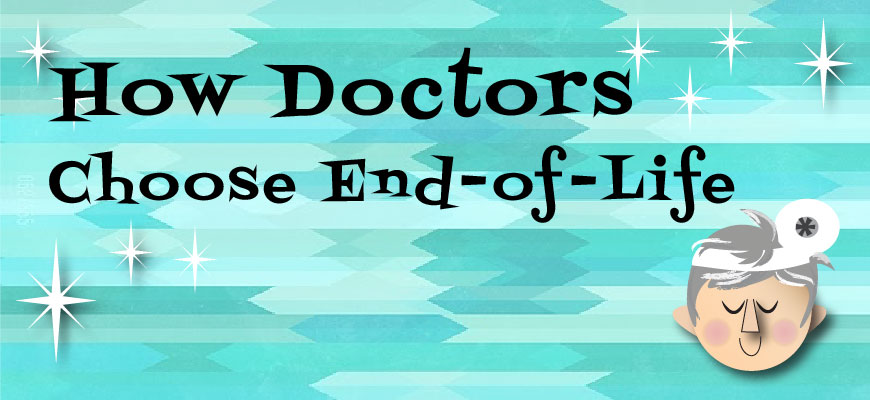How to Go? by Pat Conrad MD
How do you want to die? Where? I know for damn sure that I don’t want to die in a hospital if it can be avoided, but that sort of thing is tough to predict. Do doctors die differently from everyone else?
That is the question explored in this Washington Post article by Carolyn Johnson, “The sobering things doctors do when they die.” The author takes a look back at a 2011 article “How Doctors Die” disputing that essay’s quieter, gentler picture of dying docs: “A new study reveals a sobering truth: Doctors die just like the rest of us.”
- The study in the Journal of the American Geriatrics Society examined 200,000 Medicare beneficiaries, the majority of whom – physicians and non-physicians alike – were hospitalized in the last six months of life, with no significant difference between the groups.
- There was a statistically equal chance of an ICU stay in that period for both docs and non-docs. Interestingly, the study suggests that docs spent on average slightly more time in the ICU than non-docs (but the difference was not statistically significant).
- 46.3% of doctors used hospice, compared to 43.2% of others.
The article’s author points out the contradiction between these numbers, and surveys showing that doctors would prefer less invasive, less intensive care at the end. And of course the author got in the obligatory shot about certain medicines or surgeries worsening or hastening the end, expecting that doctors’ reticence would be based on having seen more of these bad outcomes.
- The study authors had this gem of a quote: “But Matlock and Fischer think their data may reveal the odds [are] against the patient, even when the patient is a doctor.” Paging Captain Obvious. “These things that encourage low-value care at the end of life are big systems issues … And a strong, informed patient who knows the risks and benefits — maybe even they have a hard time stopping the train.” And if the attending physician knows the patient is a physician, will he think a more aggressive approach is expected by the dying colleague and his family? I don’t know, but I wonder if that could bias the findings.
- “But the findings may reveal a deep bias that lies at the root of medicine. Fischer (a study author) pointed out that the entire health-care system is aimed at fixing problems, not giving comfort.” Gotta agree with that, as long as the family wants everything done, and their concerned attorney is hanging out in the waiting room. Probably the biggest takeaway is that the sorry health care system won’t ultimately prevent a physician’s death any more than the next person’s, dammit.
Ms. Johnson sees the latest data as undoing “the powerful mythology that doctors are dying better than the rest of the populace”, but longs for “powerful anecdotes about doctors who die better, whose last moments are spent peacefully and with family, give us hope: There is a better way.”
Amen sister. Which is why I hope to pass my last days at home surrounded by platters of hot wings, curly fries, mugs of light beer, with a football game on the wide screen and a smiling lady fluffing my pillow. Okay, my actual hope is for Hooters to start their own hospice subsidiary, for which they could charge a nice premium. Sure, by then Medicare will be busted and I’ll have to come out of pocket with whatever the government hasn’t stolen to pay for everyone else waiting in line for the crowded hospital beds. Timing is everything.










Seconal, self-administered (legal in my state, so no need to go to Tijuana), while listening to Abbey Road
How about a doobie with that seconal?
Pat, why in the world would you be drinking LIGHT beer on your death bed?
Hell at least a good single malt…
Excellent point! I’m typically an IPA man, but lighter brew might better wash down that last hot wing before, y’know….
V-fib arrest at about 65 years old.
And hope to God that there’s no wiseass with one of those automatic defibs around.
Just a few more years…